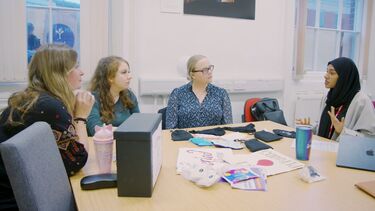Dr Maria Tomlinson, from the School of Information, Journalism and Communication hopes her research on the Government’s free period product scheme will lead to improvements in menstrual education and access to period products in schools.
A lecturer in public communication and gender has shared her research on menstrual health with parliament to help improve issues with access to period products in schools and menstrual education.
With colleagues from Irise International, a period equality organisation, Dr Maria Tomlinson, from the School of Information, Journalism and Communication, submitted written evidence to the Women and Equalities Committee about the period product scheme and menstrual education.
Dr Tomlinson undertook a research project involving focus groups with 77 teenagers in schools and colleges across Yorkshire, which discussed the government’s free period products scheme, which aims to ensure that no school pupils are unable to attend or engage with their education because they cannot afford period products.
The research found that while students celebrated the existence of the scheme, they also spoke of barriers in accessing the products it provides, such as them being locked away, being stored out of easy access from classrooms, or not being the appropriate products for their menstrual flows. In some cases, reusable products were available, but they were being avoided because students didn't know how to use them. Most alarmingly, some students shared experiences of struggling with concentration during exams or experiencing leaking because they were not allowed to bring period products into exam rooms.
Dr Tomlinson’s findings were published in her recent book ‘The Menstrual Movement in the Media: Reducing Stigma and Tackling Social Inequalities’. She also shared her research with Irise International, a charity she has been collaborating with since 2020. In consultation with Dr Tomlinson and citing her research, Irise International produced the UK Schools Toilet Policy Toolkit in 2024, which provides guidance on how to effectively implement the period product scheme in schools.
Earlier this year, the UK Government’s Women and Equalities Committee called for evidence about the period product scheme, menstrual education and other related issues, as well as possible solutions to problems in this area. Alongside Irise International CEO Chrissy Cattle and Director of Programmes and Development Acushla Young, Dr Tomlinson responded to this call with comprehensive written evidence drawing from their work and suggesting the Toilet Policy Toolkit as part of a raft of suggested solutions.
Also suggested was a primary school menstrual health curriculum developed by feminist theatre performer Belszki, based on Dr Tomlinson’s findings, which includes opportunities for students to find out about reusable products and test their absorbency with water.
Additionally, a previous project of Dr Tomlinson’s entitled ‘Faith-Informed Menstrual Health Education’ was referenced, which found that young women from ethnic minority and faith groups feel the most underserved by their menstrual education in schools.
Dr Tomlinson said: "Irise and I hope that our evidence will be discussed in parliament and will lead to improvements in menstrual education and access to period products in schools. Thanks to KE funding from the Faculty of Social Sciences, Irise, Belszki, and I will be training 10 schools to teach our menstrual education curriculum and implement the UK Schools Toilet Policy Toolkit. We have already seen the very positive impact of the curriculum on pupils' knowledge, confidence, and wellbeing in one school and cannot wait to see its impact on 10 more schools.
“Once we have gathered evidence of the impact of the curriculum and Toilet Toolkit in our ten schools, we will continue our dialogue with the government with the ultimate goal that all girls and young people with periods have access to the menstrual products, knowledge, and support that they need to achieve their potential".

